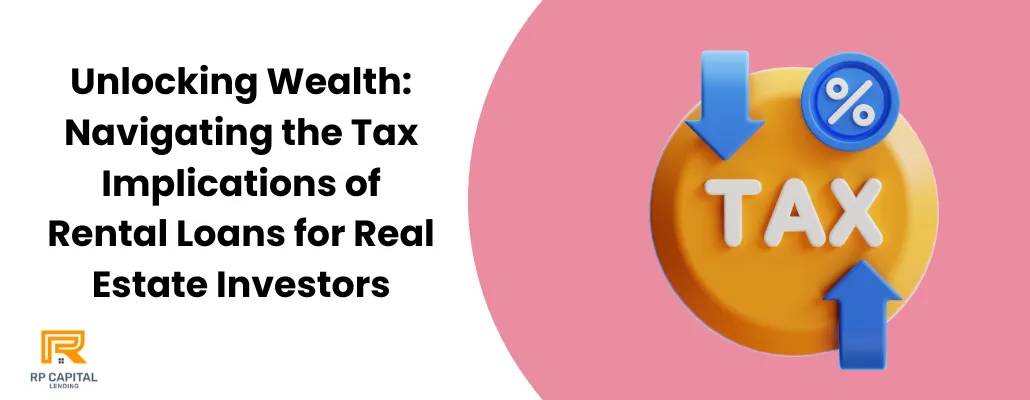Blog

Unlocking Wealth: Navigating the Tax Implications of Rental Loans for Real Estate Investors
Real estate investment presents an enticing avenue for generating wealth, offering both immediate income through rental yields and long-term capital gains. However, the journey from acquiring a property to reaping financial rewards is paved with intricate financial planning and tax considerations.
Among these, understanding the tax implications of using rental loans stands out as a critical factor that can significantly influence the profitability of your investment. This comprehensive guide aims to demystify the tax nuances associated with rental loans, ensuring you are well-equipped to make savvy investment choices.
The Intricacies of Tax and Rental Loans: A Deep Dive
Why Grasping Tax Implications is Crucial?
Imagine diving into a treasure trove, where every coin you pick up could either increase your wealth or deduct from it, depending on how you handle it. That's the essence of real estate investment with rental loans. Navigating the tax implications correctly can mean the difference between a flourishing investment and a financial misstep. Let's break down these complexities into digestible insights.
Interest Deductions: A Double-Edged Sword
One of the most immediate benefits of taking out a rental loan is the ability to deduct interest payments on your loan as an expense against your rental income. This deduction can significantly lower your taxable income, potentially saving you thousands in taxes. However, it's essential to keep meticulous records and ensure your deductions are strictly for interest related to your rental property.
Depreciation: The Silent Benefactor
Depreciation is a non-cash deduction that represents the wear and tear on your property over time. It allows investors to reduce their taxable income, thereby decreasing tax liability without affecting cash flow. The catch? It must be recaptured upon the sale of the property, which could impact your long-term tax strategy.
Capital Gains and Refinancing: A Balancing Act
Selling a property that has appreciated in value brings about capital gains tax. However, strategies such as refinancing can tap into your property's equity without incurring immediate tax liabilities. The key is understanding how to balance these financial maneuvers to align with your investment goals and tax obligations.
Operating Expenses and Improvements: Know the Difference
Operating expenses, such as repairs and maintenance, can be deducted in the year they are incurred. Improvements, on the other hand, must be depreciated over their useful life. Distinguishing between the two is crucial for accurate tax reporting and optimizing deductions.
The Impact of Loan Structures
The structure of your rental loan can also influence your tax situation. Whether you opt for a fixed-rate loan, an adjustable-rate mortgage, or an interest-only loan, each comes with its own set of tax considerations. Understanding these nuances is essential for effective tax planning and investment management.
FAQs: Demystifying Rental Loans and Tax Implications
Q1: Can I deduct all interest payments on my rental loan?
Yes, interest payments on your rental loan can be deducted as an expense against your rental income, provided they are directly tied to your rental property.
Q2: How does depreciation benefit me as a real estate investor?
Depreciation lowers your taxable income by allowing you to deduct the cost of wear and tear on your property, improving your cash flow without affecting your tax bill.
Q3: What happens to my taxes when I sell a rental property?
Selling a rental property for more than its depreciated value results in capital gains tax on the profit, including depreciation recapture on the amounts deducted in previous years.
Q4: Are there any tax benefits to refinancing my rental property?
Refinancing can provide tax-deductible interest and access to equity without incurring immediate tax liabilities, but it's vital to consider the long-term implications on your tax situation.
Q5: How do I differentiate between an operating expense and an improvement?
Operating expenses are necessary for the day-to-day maintenance of your property and can be deducted in full each year. Improvements increase the property's value and must be depreciated over their useful life.
Wrapping It Up: A Smart Investor's Approach
Understanding the tax implications of rental loans is akin to mastering a complex game where the rules can significantly impact your success. By arming yourself with knowledge and seeking professional advice when necessary, you can navigate the tax landscape with confidence, ensuring your real estate investments not only grow but flourish.
Remember, the key to maximizing your investment's potential lies in strategic planning and informed decision-making. With the insights provided in this guide, you're now better positioned to make choices that align with your financial goals and tax obligations, turning challenges into opportunities for wealth creation.
Whether you're a seasoned investor or new to the real estate game, keep these principles in mind, and watch your investments thrive under the careful eye of tax-savvy strategies. After all, in the world of real estate investment, knowledge isn't just power—it's profit.
Disclaimer: Loans only apply to non-owner occupied properties. Rates, terms and conditions offered only to qualified borrowers, may vary upon loan product, deal structure, other applicable considerations, and are subject to change at any time without notice.
Copyright © 2025. All Rights Reserved.


